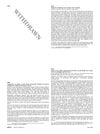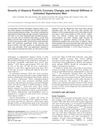 April 2016 in “Journal of The American Academy of Dermatology”
April 2016 in “Journal of The American Academy of Dermatology” AGA patients have a lower quality of life than AA patients.
29 citations,
March 2010 in “Cancer epidemiology” Men who start losing hair at age 30 may have a lower risk of prostate cancer.
 6 citations,
March 2020 in “Anais brasileiros de dermatologia/Anais Brasileiros de Dermatologia”
6 citations,
March 2020 in “Anais brasileiros de dermatologia/Anais Brasileiros de Dermatologia” Most people in Turkey start getting gray hair around 33 years old, with factors like age, education, hair loss, skin type, family history, and anxiety playing a role.
227 citations,
November 2004 in “Medicine” Older adults diagnosed with lupus show less severe symptoms but have a lower survival rate, often due to age-related factors.
 21 citations,
February 2012 in “Journal of the European Academy of Dermatology and Venereology”
21 citations,
February 2012 in “Journal of the European Academy of Dermatology and Venereology” Late-onset alopecia areata in Taiwanese patients is more common in women, usually starts at age 57, often involves less than 10% hair loss, and may have a minimal link to thyroid issues.
 234 citations,
December 1996 in “Journal of The American Academy of Dermatology”
234 citations,
December 1996 in “Journal of The American Academy of Dermatology” Middle-aged women with chronic telogen effluvium experience increased hair shedding but usually don't get significantly thinner hair.
 11 citations,
January 2019 in “Sexual Medicine”
11 citations,
January 2019 in “Sexual Medicine” Younger transgender women have surgery earlier, are mostly attracted to men, and show more preoperative depression that improves after surgery compared to older transgender women.
 62 citations,
April 2008 in “Neurobiology of aging”
62 citations,
April 2008 in “Neurobiology of aging” Scientists found a gene in mice that causes early hearing loss.

Early-onset baldness is linked to genetics, lifestyle, and can indicate higher risk for heart and metabolic diseases, and affects mental health.
1 citations,
May 2017 in “InTech eBooks” New treatments focusing on immune pathways show promise for stubborn hair loss.
January 2012 in “Guangdong Medical Journal” Family history affects onset and severity of androgenic alopecia, but treatment success depends more on therapy duration.
 32 citations,
August 1999 in “Journal of Investigative Dermatology”
32 citations,
August 1999 in “Journal of Investigative Dermatology” Early onset hair loss linked to genetics and androgen levels.
 77 citations,
June 2017 in “Advances in Therapy”
77 citations,
June 2017 in “Advances in Therapy” New treatments for Alopecia Areata, like JAK inhibitors, show promise for hair regrowth and are likely to change future treatment approaches.
 25 citations,
July 2021 in “Journal of Medical Virology”
25 citations,
July 2021 in “Journal of Medical Virology” COVID-19 can cause various skin issues, including rashes and hair loss, which usually heal on their own and don't always indicate severe illness.
 13 citations,
December 2016 in “Journal of Cosmetic Dermatology”
13 citations,
December 2016 in “Journal of Cosmetic Dermatology” Oxidative stress increases in early hair loss, and family history plays a role; antioxidants may help future treatments.
 5 citations,
July 2016 in “Journal of Clinical Hypertension”
5 citations,
July 2016 in “Journal of Clinical Hypertension” Men with severe early-onset baldness may have worse heart artery function and stiffer arteries if they have high blood pressure.
 1 citations,
September 2013 in “Elsevier eBooks”
1 citations,
September 2013 in “Elsevier eBooks” Hair ages and thins due to factors like inflammation and stress, and treatments like antioxidants and hormones might improve hair health.
 28 citations,
July 2011 in “Journal of Plastic Reconstructive and Aesthetic Surgery”
28 citations,
July 2011 in “Journal of Plastic Reconstructive and Aesthetic Surgery” A patient had skin tissue death at the hair removal site after a hair transplant, which was treated with surgery.
 3 citations,
July 2022 in “Indian journal of dermatology, venereology, and leprology”
3 citations,
July 2022 in “Indian journal of dermatology, venereology, and leprology” Patients with alopecia areata have higher oxidative stress and lower antioxidant levels.
 44 citations,
November 2009 in “Archives of Dermatology”
44 citations,
November 2009 in “Archives of Dermatology” CYLD mutations cause a variety of skin tumors with symptoms starting around age 16, and treatments are currently limited.
Early diagnosis and treatment of frontal fibrosing alopecia are crucial to prevent permanent hair loss.
 May 2021 in “Open Access Macedonian Journal of Medical Sciences”
May 2021 in “Open Access Macedonian Journal of Medical Sciences” People with premature hair graying have an imbalance between harmful and protective molecules in their body, hinting that antioxidants might help.
 7 citations,
December 2018 in “Journal of Cosmetic Dermatology”
7 citations,
December 2018 in “Journal of Cosmetic Dermatology” Eating vegetarian, having allergies, and family history might be linked to getting gray hair early.
 195 citations,
July 2005 in “American Journal of Human Genetics”
195 citations,
July 2005 in “American Journal of Human Genetics” Genetic variation in the androgen receptor gene mainly causes early-onset hair loss, with maternal inheritance playing a key role.
 28 citations,
August 2011 in “Journal of The American Academy of Dermatology”
28 citations,
August 2011 in “Journal of The American Academy of Dermatology” Early hair loss may indicate prostate issues.
 45 citations,
November 2009 in “British Journal of Dermatology”
45 citations,
November 2009 in “British Journal of Dermatology” Women with early hair loss have higher blood pressure and aldosterone; screening and treatment may help.
11 citations,
June 2015 in “Scientific Reports” The mtDNA N haplogroup is linked to a higher risk of late-onset lupus and specific symptoms in Han Chinese women.

A 32-year-old man with early graying hair shows a unique pattern, suggesting more research is needed on why hair grays early.
 1 citations,
May 2021 in “Annals of the rheumatic diseases”
1 citations,
May 2021 in “Annals of the rheumatic diseases” Tofacitinib is a promising treatment for children with rheumatic diseases.
 16 citations,
November 2013 in “European Journal of Dermatology”
16 citations,
November 2013 in “European Journal of Dermatology” Hair gets thinner and grayer with age, and density decreases more in men on top and in women on top and back.
























